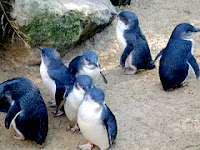NEW ZEALAND - It must be hard being a hungry penguin chick waiting for your parents to return with food - especially when they don't return with enough, or don't return at all.
Luckily for six underweight yellow-eyed penguin (hoiho) chicks, they were found by Department of Conservation (DOC) staff at the Long Point reserve in the Catlins as part of their "pre-fledge weigh".
"They should really weigh about 4kg and 5kg by now, so these guys are all at least a couple of kilos underweight," DOC ranger Cheryl Pullar told the Otago Daily Times.
She said she suspected the parents of two of the chicks might have been injured, and was not sure what had happened to the parents of the other four chicks. The rest of the chicks at Long Point were healthy.
So the rescued chicks will spend about three weeks in the lap of luxury, being fattened up on smolt donated by Nelson company King Salmon.
"We'll feed them up so they have a better chance of survival in their first year at sea ... It's about helping ensure there's a breeding population out there," said Mrs Pullar.
Another yellow-eyed penguin, an adult male, also got lucky when he was spotted in distress by a wildlife photographer at Dunedin's St Clair beach.
DOC officer David Agnew, who rescued the penguin, told the Otago Daily Times that the penguin was showing signs of moult and was very thin. He also had a wound under his left wing, but Mr Agnew said that it was superficial.
The penguin will be taken to Penguin Place to recuperate.
Sources
Hand-fed hoiho on diet of salmon by Nigel Benson, 22 January 2011, Otago Daily Times
Penguin rescue at St Clair beach by Fergustus, 21 January 2011, Otago Daily Times
Luckily for six underweight yellow-eyed penguin (hoiho) chicks, they were found by Department of Conservation (DOC) staff at the Long Point reserve in the Catlins as part of their "pre-fledge weigh".
"They should really weigh about 4kg and 5kg by now, so these guys are all at least a couple of kilos underweight," DOC ranger Cheryl Pullar told the Otago Daily Times.
She said she suspected the parents of two of the chicks might have been injured, and was not sure what had happened to the parents of the other four chicks. The rest of the chicks at Long Point were healthy.
So the rescued chicks will spend about three weeks in the lap of luxury, being fattened up on smolt donated by Nelson company King Salmon.
"We'll feed them up so they have a better chance of survival in their first year at sea ... It's about helping ensure there's a breeding population out there," said Mrs Pullar.
Another yellow-eyed penguin, an adult male, also got lucky when he was spotted in distress by a wildlife photographer at Dunedin's St Clair beach.
DOC officer David Agnew, who rescued the penguin, told the Otago Daily Times that the penguin was showing signs of moult and was very thin. He also had a wound under his left wing, but Mr Agnew said that it was superficial.
The penguin will be taken to Penguin Place to recuperate.
Sources
Hand-fed hoiho on diet of salmon by Nigel Benson, 22 January 2011, Otago Daily Times
Penguin rescue at St Clair beach by Fergustus, 21 January 2011, Otago Daily Times





